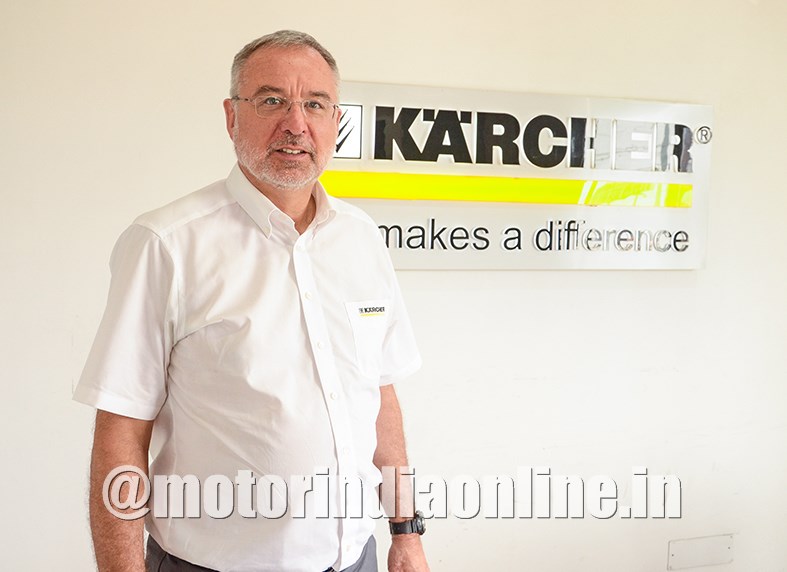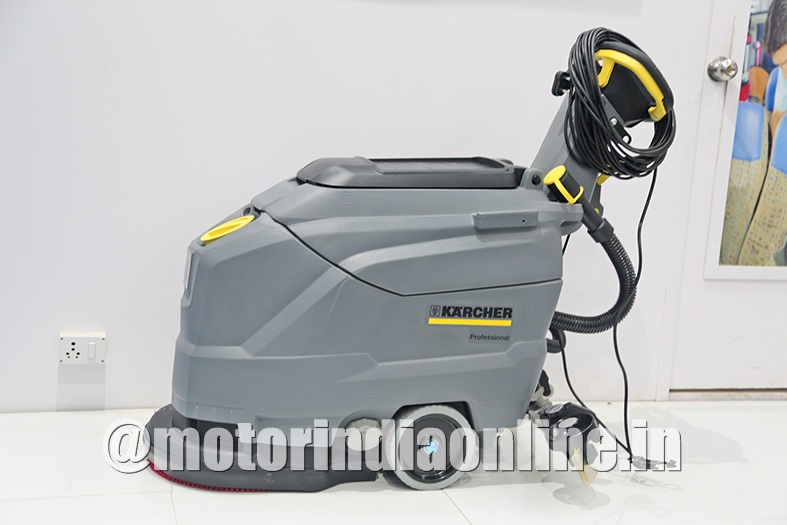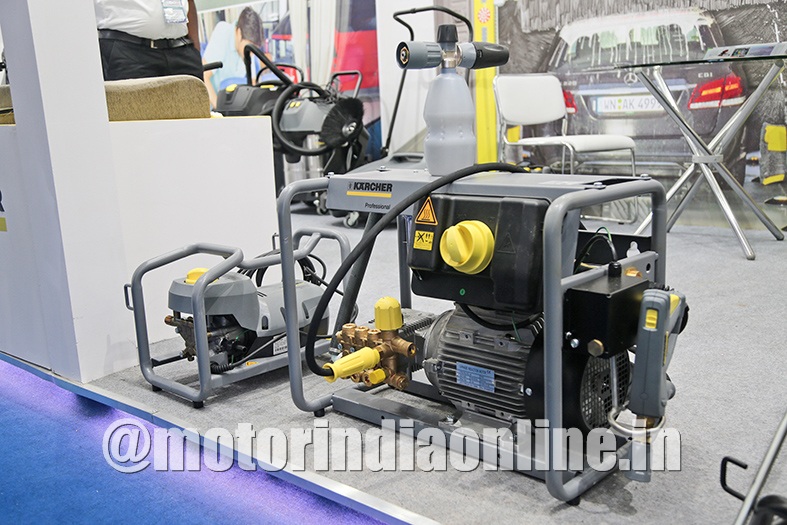Managing Director Ruediger Schroeder speaks to Dhiyanesh Ravichandran on his company’s expanding reach in the Indian market with a wide range of specialised products and responsive service network, and why his business is largely insulated from the on-going market deceleration

The trait of being clean and tidy is an essential virtue in the automotive business, may it be presenting groovy vehicles among rental customers or shiny sales floor in a dealership to impress the buyers. It isn’t simple though since it requires specialised and powerful systems to ensure ‘sparkling clean’ impressions round-the-clock in a professional setup. German-based Kärcher is a name to reckon with in the field of cleaning technology and systems for various industry and professional applications globally, including automotive. It offers cleaning concepts that are tailored to the specific requirements of car dealerships, workshops and service stations.
Kärcher made its entry in the Indian market in 2011 with a direct subsidiary and is now a well-established player with a strong product portfolio and service support across the country. The company has emerged as an experienced partner for automotive enterprises including OEMs and their dealers, independent garages and service centres, highway washing kiosks, auto spas and mobile service vans, with a comprehensive range of products from pressure pumps to automated washing bays for trucks and buses. It is also supportive to large commercial vehicle fleets and STUs by offering automated washing bays and other customised cleaning solutions.
On the Indian front
“India is a key market for Kärcher at the international level, as it is one of the fastest-growing markets for both consumer and professional automotive cleaning systems. It has moved up to 29th position globally from No. 50 five years ago,” says Managing Director Ruediger Schroeder. “I came to India eight years ago, and a lot has changed in the Indian automotive scene since then – may it be the fast proliferation of automotive brands and their dealerships or organised car cleaning workshops across the country. People today recognise the need for effective and customised cleaning solutions,” he adds.
The company’s performance in India is growing at double figures for the past five years. Even this financial year, amid automotive market slowdown and sluggish domestic demand, Kärcher is posting growth a bit more than what it achieved last year. “This is fairly impressive; we are finally reaping the real potentials of the Indian market. It is bound to grow even more in the future, and we are catching-up with expansion and consolidation of our brand, products and service network,” Schroeder notes.
Expanding the portfolio
Kärcher Cleaning Systems is constantly expanding its offerings, while also pioneering new technologies in automotive cleaning. Schroeder cites the latest launch of a new automotive parts’ cleaner featuring oil-digesting live bacteria, making it bio-degradable for oily and dirty sludge. “This technology is quite successful in Europe and the West, and we have launched the same in the Indian market as well,” he states. The company’s technical and sales teams assist institutional buyers in identifying their exact cleaning requirements and suggest customised solutions.
The company is also growing strong in e-commerce channels for consumer products aimed at individual buyers. Asked about the stiff competition from rival brands and cheaper Chinese products available on e-commerce platforms, Schroeder replies that the key difference lies in after-sales service support. “Many buyers are wooed by cheaper vacuum cleaners and pressure pumps that are widely available these days, but they end up facing problems in repairs and sourcing spares as there is absolutely no service support for buyers.”
Schroeder further adds that Kärcher has a centralised spare parts supply, with a warehouse located in Gujarat and vibrant distribution channels, for the ease of its customers. In addition, there are 13 branch offices spread across the country exclusively set up for professional products where spares support is also extended. The company has started local manufacturing of its products in India, although half of its production is currently being exported. “We are clear that we consider India as a ‘manufacturing base’, and not necessarily an ‘export base’. There is so much potential yet to unfold in the domestic market, there is no need to overlook the local demand for exports,” he opines.
No impact of slowdown
Asked about the impacts of the on-going market slowdown on Kärcher’s business in India, the MD comments that the automotive service sector is largely secure, as the drop in demand for new cars and other aggregates doesn’t directly impact the servicing needs of existing vehicles. “Six months of a bearish trend is not such a long period to affect the service industry, unlike a consistent deceleration for over two years or so. The current situation may not continue beyond April next year even in the worst-case scenario, so we are quite safe,” he says.
In terms of individual segments that Kärcher is catering to, Schroeder states that there may be some drop in demand for cleaning systems among OEM and other auxiliary industries owing to delays in capex. “But this year we have seen new automakers like Kia Motors, MG Garages and BMW Motorrad entering India and we have supplied our systems to them and their dealers as well. Dealerships are facing some heat, but business from them is good so far. We don’t see any immediate drop, but a prolonged slowdown may impact their purchasing decisions in the coming months,” he says.
Private car cleaning enterprises, on the other hand, are hardly affected by new car market sentiments, and therefore Kärcher’s sales are pretty strong in this segment. The other segment consisting of STUs and CV fleets has not picked up greatly in India so far, but the company is trying all means to create awareness among them on cost-benefits and better resource utilisation with high-tech and professional cleaning systems. “With improved government spending on upgradation of STU maintenance architecture and induction of new bus fleets, the demand from this segment will pick up,” adds Schroeder.

